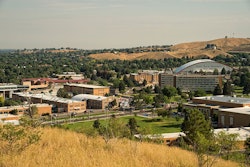The pandemic has placed an intense burden on health care workers and efforts are underway to increase the health care workforce.
In September, the American Nurses Association (ANA) urged the U.S. Department of Health and Human Services (HHS) to declare the nurse staffing shortage a national crisis. In a letter to HHS Secretary Xavier Becerra, ANA president Dr. Ernest Grant called for the administration to acknowledge and take concrete action to address a “crisis-level nurse staffing shortage that puts nurses’ ability to care for patients in jeopardy.”
 Dr. Ernest Grant
Dr. Ernest Grant
According to the Bureau of Labor Statistics, the U.S. lost 17,500 health care workers in September and 524,000 health care employees since the start of the pandemic. In mid-October, the Biden administration announced its plans to direct $100 million to the National Health Service Corps (NHSC) to help address the health care worker shortage, which, in addition to nurses, includes physicians, physician assistants, nurse practitioners and other health-related occupations.
While the start date for the funds is in September 2022, individuals engaged in higher education as well as organizations supporting the education and career success of these workers are focused on current and future solutions to keep the health care workforce strong.
Pandemic impact
“It’s taken the pandemic to expose how heavily ingrained racism is in our health care system,” says Dr. Danielle McCamey, founder, CEO and president of DNPs of Color. “My hope is that we … improve health care to make a bigger leap to achieving health equity.”





















